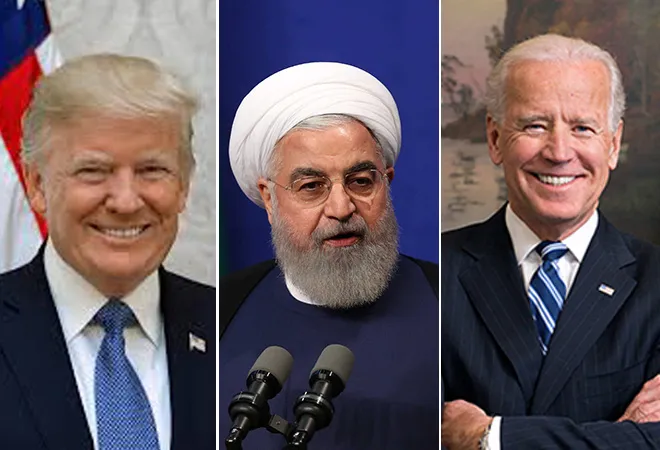-
CENTRES
Progammes & Centres
Location
As the Abraham Accord consolidates Iran’s centrality in the US' approach to the Middle East, Trump’s legacy of “maximum pressure” against Iran could prolong into a Biden presidency.

Iran has been central to President Donald Trump’s foreign policy for the Middle East since coming to power in January 2017. Having derided the Joint Comprehensive Plan of Action (JCPOA) agreement throughout his campaign, Trump eventually withdrew the US from the same in May 2018. This drastic change in thinking sought to take back Iran into sanctions, economic isolation and military pressure, and thereby dismantle Obama’s efforts over eight years to end the US’ impasse with Tehran.
Through the Iran Nuclear Deal negotiations that lasted between 2013 and 2015, the Middle East was immensely divided with the Sunni block — led by Saudi Arabia, UAE and others, raising strong concerns over the ‘mainstreaming’ of Iran with its economic revival without the Shia power being forced to deliver on reigning-in its expansionist agenda — led by its Islamic Revolutionary Guard Corps (IRGC), Hezbollah in Lebanon and proxies in Syria, Yemen and other conflict theatres. The animosity against Iran had risen to levels, that the likes of Saudi Arabia and UAE clandestinely — but increasingly, started to warm up to Israel, with both sides seeing a common enemy in Iran. This was only coupled with rising questions over American security guarantees in the region with an increasing appetite in Washington to deploy fewer military assets to the region.
The killing of Iranian general Qasseim Soleimani by a US drone strike in Baghdad in January 2020 brought the US–Iran dynamic to a point of no return. Soleimani, as the chief of the IRGC, was instrumental in the Shia power’s expansions within the Syrian civil war, and bringing Shiite militias to the borders of Israel — which pushed Jerusalem to launch direct attacks in and around Damascus and the contested Golan Heights region. As a result, the Trump administration, which initially had decided to withdraw troops from Syria was pushed to re-deploy merely months later by the likes of Saudi Arabia and the UAE. This, while US’s NATO ally Turkey, was both supporting local Islamist militias and banding with Russia to create an alternative buffer. Overtime, this only undermined the Gulf countries’ influence, who had started to review their approach towards Syria’s embattled leader Bashar al-Assad. The UAE had re-opened its embassy in Damascus in 2018, signalling a shift in both the Gulf power block’s approach to the crisis, and intra-Gulf understanding of the same as the Saudi-UAE led blockade of Qatar continued.
In June 2019, reports suggested that Trump had authorised strikes against Iran after the downing of a US military drone by Iranian surface-to-air missiles, only to then pull back mid-way of the operation. While a direct military confrontation with Iran is something the US under Trump had envisaged, the Gulf countries in the region, despite fighting proxy wars with Iran in theatres such as Syria, Yemen and beyond, worked to avoid a full-scale war. Instead, they wanted to offset the same via strengthened US push against the Iranian regime which could include tactical but limited use of military operations, and renewed rigour in intelligence and sabotage operations against Iranian interests.
Furthermore, the Sunni Arab world during Trump’s presidency has also gone through internal turmoil, for which the Trump administration's support has been critical. This ranges from the impending accession of Mohammed bin Salman as King of Saudi Arabia, his role in the Jamal Khashoggi murder case and its fallout, Washington’s limited pressure against Riyadh and Abu Dhabi over Yemen and Libya, the intra-GCC crisis with Qatar, and other human rights issues — all whilst maintaining the Iran threat as the focus.
This unfettered US support has the Gulf capitals now pining for a Trump return. This has been particularly evident with the UAE–Israel normalisation in form of the Abraham Accords, signed between Israel, UAE and Bahrain on 16 September 2020 at the White House — handing Trump a significant victory for both US foreign and domestic policy optics.
However, even if Trump were to lose come November, Biden will hardly escape this fait accompli.
Under his pledge of “rescuing” US foreign policy after Trump, the Democratic presidential nominee and former Vice President Joe Biden has committed to “rejoin” the Iran Nuclear Deal. Beyond reinstating the landmark deal of the Obama-Biden years, Biden’s motivation to do so also stems from dampening the impact that America’s withdrawal from the deal has had in accentuating fault-lines in Washington’s transatlantic ties. However, given the ramifications of the Trump years in terms of Iran gradually jettisoning its commitment to the deal — chiefly in terms of it now having over 10 times the amount of enriched uranium permissible under the deal, chances of a swift reversal in America’s position would be slim.
Furthermore, on Biden’s plan to “offer Tehran a credible path back to diplomacy” and pursue that “as a starting point for follow-on negotiations”, Iranian Foreign Minister Javad Zarif has said Iran “will not renegotiate” the terms. Hence, to “claw back elements” of the earlier deal, at least in the short-term, a Biden administration could continue Trump’s “maximum pressure” policy to coax Iran — to at least have it return to pre-Trump adherence to the deal.
Biden could also face domestic opposition, especially if reports of Democrats being poised to take control of the US Senate do not actualise. At that point, a Republican-led Senate could once again emerge as an opponent to American participation in the deal, as in case of Senate Republicans’ declaration to not ratify the 2015 nuclear deal under Obama. Back then, in an apparent breach of diplomatic protocol and constitutional precedent on the executive branch’s hold over foreign policy matters, Senate Republicans even penned an open letter to Ayatollah Ali Khamenei. As Trump subsequently did, the letter had warned Iran’s Supreme Leader of the constitutional provision of Obama’s successor to “revoke such an executive agreement” that is “not approved by the US Congress” with “the stroke of a pen.”
Moreover, in face of greater Israel-Arab alignment on the issue of Iran, it would be cumbersome for the Biden administration to once again temper Israeli and Arab opposition to the Iran Nuclear Deal, as the Obama administration did by not encouraging their direct involvement in the P5+1 talks. With Israel specifically, the Biden campaign seems to have anticipated the coming challenge, and hence has announced its commitment to secure its preeminent ally in the region. In doing so, the campaign has prominently underscored the Obama-Biden administration’s 2016 finalisation of the largest of its kind aid package for Israel (US$ 35 billion over 10 years).
With the Abraham Accords however, as the region gradually reorders around Iran -- and not the Israeli-Palestinian conflict, prospects of the two being linked stand accentuated. For instance, Biden’s announced commitment to press Israel to not take actions that “make a two-state solution impossible” — like annexing the West Bank, could be used to consolidate a heavy-handed US approach to Iran. In pushing Biden to expand the scope of the deal for instance, Israel could once again raise the spectre of annexing the West Bank. In view of the annexation’s “temporary” suspension being at the core of the Israel-UAE and Israel-Bahrain normalisation, the political optics of those newly christened peace deals unravelling would bear on Biden’s calculations.
Moreover, additional security guarantees for Arab nations would stand in order. Especially since, a prime motivation behind UAE and Bahrain normalising relations with Israel has reportedly been towards potentially acquiring advanced US weaponry that Washington sells only to those Middle East nations that are at peace with Israel. Moreover, if other Arab nations also join in by normalising relations with Israel, the pressure to cater to Arab security concerns would multiply — and by that extension also their influence over a renewed deal. Hence, short of entirely untethering from the Palestinian cause, greater Arab alignment with Israel signifies a realpolitik realisation that the road to their common security interests and continued anti-Iran posture by the US, runs through Jerusalem.
For India, a Biden administration could certainly be sympathetic on strategic interests like the Chahbahar port, or its preference for reinstating Iran as a key source for its energy needs. However, owing to greater Israel-Arab alignment tying Biden’s hands, it would continue to be difficult for New Delhi to either seek some reprieve or insulate the issue of its relations with Iran from its engagement with the emergent Arab-Israel consensus.
Hence, with continued Iranian centrality in America's approach to the Middle East, Trump’s legacy of “maximum pressure” against Iran could prolong into a Biden presidency.
The views expressed above belong to the author(s). ORF research and analyses now available on Telegram! Click here to access our curated content — blogs, longforms and interviews.

Kabir Taneja is a Deputy Director and Fellow, Middle East, with the Strategic Studies programme. His research focuses on India’s relations with the Middle East ...
Read More +
Kashish Parpiani is Senior Manager (Chairman’s Office), Reliance Industries Limited (RIL). He is a former Fellow, ORF, Mumbai. ...
Read More +